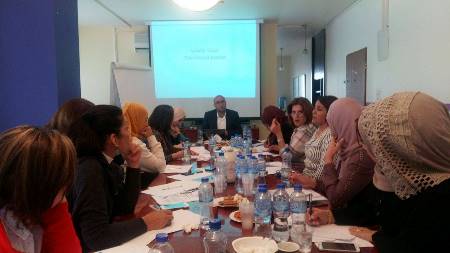|
Informative session at MIFTAH on concept of transitional justice within context of the occupation and internal conflict
On November 1, MIFTAH held an informative session in coordination with the Independent Commission for Human Rights’ Ombudsman’s Office on the concept of transitional justice, mechanisms for achieving national reconciliation and strengthening the social fabric, which targeted members of the women shadow committee ( WIFAQ)women’s committee for national reconciliation. Islam Tamimi of ICHR broached the subject of transitional justice within the context of the Israeli occupation, the internal conflict, the projections of this concept and how it can be reflected on the ground. He pointed to a number of experiences in countries at both the regional and international levels. While some experiences succeeded, Tamimi said, others oscillated between failure and success. He exclusively cited the experiences of South Africa and Morocco. South Africa closed the chapter of apartheid and dealt with its effects to form a new political epoch, while Morocco’s experience was the result of political reform achieved after the death of Moroccan King Hassan II. As a result, a commission for equity and conciliation was formed. In his definition of transitional justice as a concept, Tamimi said it is a group of judicial and non-judicial processes for addressing the legacy of the past and building a more welcoming space that safeguards rights and freedoms. Hence, it is a practical framework for regulating social and political relationships. He said the idea of transitional justice is based on the formation of fact-finding committees or ‘truth-seeking”, as indicated in the UN definitions of the concept. “One of the most important conditions for transitional justice is public recognition from both sides and from both poles of the conflict. That is, not to deny, to give consideration to the victims, offer them an apology and to pardon and forgive.” Tamimi noted that part of the violations committed in conflict areas around the world are gender-based, which is why it is imperative for women to be involved in the truth-seeking and reconciliation committees and to carry out reforms in judicial, legislative and executive institutions. According to Tamimi, the goals of transformative justice include: establishing institutions subject to accountability and regaining trust in these institutions; rendering access to justice possible for the most vulnerable sectors of society; guaranteeing that women and marginalized sectors play an active role in seeking a just society. Tamimi also pointed out what he called the guiding principles for the concept of transformative justice, represented in the right to truth about the violations committed, the fate of missing persons, the right to reparation for victims of grave human rights violations and the obligation of states to guarantee the non-recurrence of future atrocities by taking various measures. Tamimi stressed that there must be total conviction regarding the formation of the truth-seeking and fact-finding committees; that mechanisms of prosecution should be adopted; impunity must be prevented through enabling courts to carry out their role, which necessitates an independent judicial authority; ensuring that transitional justice is embraced in its entirety; and for reconciliation committees to develop their understanding and perspectives of this justice. Tamimi urged the members of (WIFAQ) to initiate a social dialogue on forming a truth and reconciliation committee, on condition that it is institutionalized and enjoys an official and partisan role. This will allow it to begin with its tasks in the next stage and agree on criteria for membership; achieve geographic contiguity in the West Bank and Gaza Strip; work towards expanding the circle of true partnership between all parties; build a climate of trust; prevent the warring parties from taking unilateral measures that could disrupt the reconciliation; take confidence building steps including lifting punitive measures off of Gaza and informing the public of the latest developments regarding the reconciliation process. Finally, Tamimi said he considers the Israeli occupation to be the main hindrance to achieving reconciliation and that transitional justice cannot be achieved within the context of this occupation because there are basic rights that must be regained, first and foremost the right of return. The meeting was held as part of efforts to promote the political participation of (WIFAQ) women’s committee, formed by MIFTAH in 2016 and which includes social and political women leaders and activists from the West Bank and Gaza Strip. The goal of the committee is to contribute to achieving national reconciliation and to press for the active participation of women in current efforts to rebuild Palestinian society on the basis of social justice and the rule of law.

http://www.miftah.org |